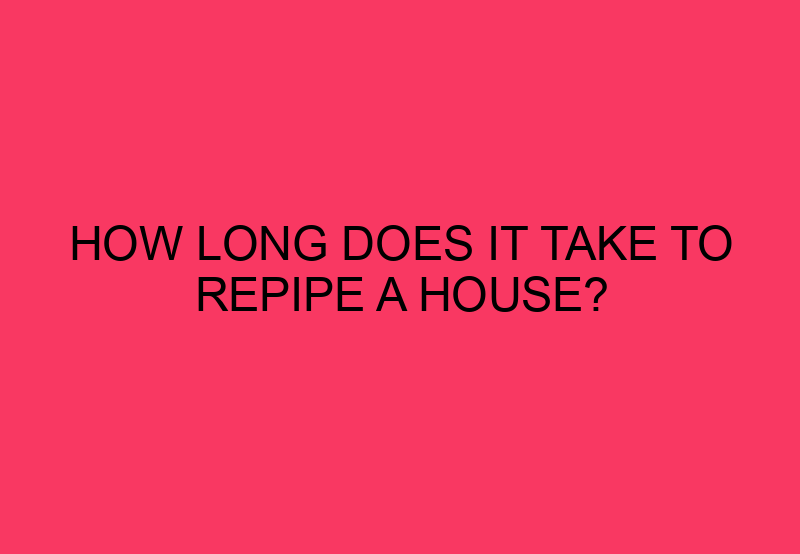Repiping a house can seem like a daunting task. Whether your pipes are damaged, outdated, or you’re just looking to upgrade, the thought of the time and investment required can leave you feeling overwhelmed. However, the exact amount of time needed to repipe a house depends on several factors, such as the size of the home and the complexity of the project. In this guide, we’ll walk you through everything you need to know about how long it takes to repipe a house.
The Factors That Affect Repiping Time
The first factor in determining how long it will take to repipe your house is the size of your home and the number of units. If you live in a smaller home, you’ll be looking at a much shorter repiping timeline than someone who owns a large home with multiple units.
However, the size of your home isn’t the only factor. The complexity of the project will also affect how long it will take to repipe your home. Projects that require a lot of demolition or involve difficult-to-reach spaces like crawl spaces or attics will take longer.
Another factor that can impact the timeline is the type of materials you choose to use for your piping. While copper piping is a popular choice, it may take longer to install than other materials because it requires welding. PVC piping, on the other hand, can be faster to install.
How Long Will It Take to Repipe My Home?
On average, repiping a house can take anywhere from a few days to a few weeks. However, this timeline can vary depending on the factors mentioned above. For a small home, you can expect the process to take anywhere from 1-3 days. A larger home with multiple units can take anywhere from 3-5 days.
Keep in mind that these timelines don’t take into account any additional work needed for other home renovations. For example, if you’re renovating your kitchen, you’ll need to factor in the time required to remove and replace any piping that runs through that area. Also, if you’re living in your home during the process, expect to add a few additional days to the timeline to accommodate for breaks and cleanup.
Why ShouldYou Repipe Your Home?
Repiping your home has many benefits. Here are just a few reasons you might consider repiping your home:
Increased Water Pressure
If you’re experiencing a decrease in water pressure, it could be due to old or corroded pipes. Repiping your home will replace old pipes with newer ones and increase water pressure in your home.
Improved Water Quality
Old pipes can contain rust, sediment, and other contaminants that can decrease the quality of your water. Repiping your home can improve the quality of your water and make it safer to drink.
Cost Savings
While repiping your home may seem like a significant investment upfront, it can save you money in the long run. Old or leaky pipes can lead to significant water waste, which can increase your monthly water bill.
Tips for Hiring a Professional
When it comes to repiping your home, it’s essential to hire a professional. Here are a few tips for finding a trusted plumbing professional:
Look for Online Reviews
Before hiring a plumber, check their online reviews to see what past customers are saying. Look for a plumber with a high rating and plenty of positive reviews.
Ask for References
Ask the plumber to provide references from past clients. Reach out to these clients and ask them about their experience with the plumber.
Get a Detailed Estimate
Before hiring a plumber, get a detailed estimate for the project. This will help you understand the scope of the project and ensure that you’re not surprised by any additional fees.
A Final Word on Repiping Your Home
Repiping your home can seem like a daunting task, but it doesn’t have to be. By understanding the factors that can affect the timeline and hiring a trusted professional, you can have peace of mind knowing your home is in good hands. And with the benefits of repiping, like increased water pressure and improved water quality, you’ll be glad you made the investment.
